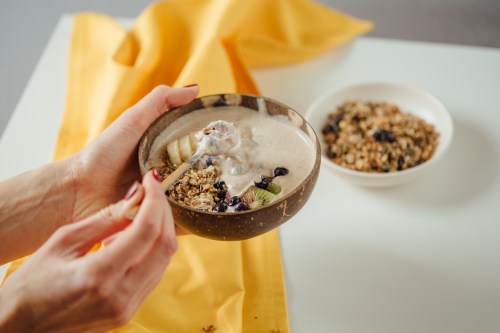Sabrina Carpenter Swears by These Health Hacks to Support Her Immune System
But do they actually work? Here's what the science says.

At this point in life, you’re likely aware that most celebrities have intense schedules that keep them constantly on the go. But while many don’t admit how tired they are, Sabrina Carpenter was completely honest at the Met Gala about her energy levels.
Experts in This Article
infectious disease expert and senior scholar at the Johns Hopkins Center for Health Security
owner of Keatley Medical Nutrition Therapy
During a conversation with Emma Chamberlain for Vogue, the 25-year-old singer admitted that she was “exhausted.” But Carpenter also shared that she got a “solid nine hours of sleep” the night before. When Chamberlain asked if Carpenter was stressed about the event, she explained she wasn't stressed but thought, “Oh, it would suck if I woke up and my immune system, like collapsed.”
Chamberlain proceeded to ask how Carpenter stays healthy. Carpenter's short-and-sweet response? "Ginger shot, turmeric," she says. “I’m super natural and homeopathic,” she added.
We know getting enough sleep is one of the key ingredients for well-being. But ginger shots and turmeric—while used widely in homeopathic circles—may not always be the perfect remedy for your immune system. We asked our experts, and here's what they had to say about the science behind Carpenter's immune-boosting routine.
Herbal remedies do have some perks
Turmeric and ginger are very different, but they do have some overlap when it comes to immune health. “Both turmeric and ginger are known to have anti-inflammatory compounds within them,” says Amesh A. Adalja, MD, infectious disease expert and senior scholar at the Johns Hopkins Center for Health Security. “These may help with some immune function.” (FYI, inflammation can weaken your immune system and is linked to a higher risk of getting sick and developing more serious health conditions.)
Ginger contains compounds like gingerol that have been shown to reduce inflammation1, support digestion2, and potentially relieve nausea3, explains Scott Keatley, RD, co-owner of Keatley Medical Nutrition Therapy. “There’s some evidence that it can mildly stimulate circulation and help with muscle soreness after exercise,” he continues.4 “It's a great tool in the wellness toolbox, especially during times of physical or emotional stress when inflammation ramps up.”
Research on ginger remains ongoing, but some lab studies have found that ginger has antiviral properties, suggesting that it could help stave off or shorten a cold, flu, and other viruses.5,6
Turmeric, on the other hand, contains the active compound curcumin, which is best known for its anti-inflammatory and antioxidant effects. “[Turmeric] is being studied for its role in reducing joint pain7, improving metabolic health8, and even protecting against certain chronic diseases9,” Keatley explains. “When inflammation is a root cause, turmeric can offer meaningful support.”
One study published in the Journal of Dietary Supplements also found that people who took curcumin supplements had shorter durations of a cold than those who didn’t.10
But, they might not be as effective as you hope
The idea of regularly tossing back immunity shots for good health is appealing, but the science isn’t quite there to support this yet. “It is unclear whether the dose [that] is taken in shots actually has a clinically meaningful effect,” Dr. Adalja says.
Keatley agrees. “Ginger is not a cure-all,” he adds. “Its effects are modest, especially in the context of an acute illness or immune challenge.”
Curcumin is also not absorbed well without fat or piperine (from black pepper), Keatley says. “Unless it's taken consistently and in the right formulation, the effect is probably minor,” he says. “And just like ginger, turmeric doesn’t ‘boost’ the immune system—it supports it, which is different.”
Good sleep is a solid immune-boosting hack
While Carpenter didn’t list sleep as part of her health regimen, she implied it. And Dr. Adalja says she’s on to something with this.
“Having full nights of sleep does improve immune function,” he says. “This has been demonstrated by enhanced susceptibility to common cold viruses in those who are sleep deprived.” And there are more evidence-based studies that support the immune-boosting effects of sleep, which may make it a more reliable wellness hack than herbal remedies.
One study had 153 people report their sleep duration and sleep efficiency (the amount of time they were actually asleep in bed) over two weeks. The researchers discovered that people who got less than seven hours of sleep were nearly three times more likely to get a cold than those who slept eight hours or more.11
Another study published in the journal Sleep supports this finding. Researchers in this study tracked the sleep habits of 164 study participants for seven days before exposing them to rhinovirus (aka the most common cause of the common cold). They found that people who slept six hours a night or less were four times more likely to catch a cold after being exposed to the virus compared to those who slept for seven or more hours each night.12
If ginger and turmeric are your thing, there’s no reason not to enjoy them
While there’s a strong case for getting good sleep over taking ginger and turmeric shots to support your immunity, experts say you can still safely enjoy these drinks. You’ll just want to manage your expectations about how much of an effect they actually have on your immune health.
“They can contribute to a healthy pattern of behavior, but they aren’t magic bullets,” Keatley says. “They hydrate you slightly, deliver some phytonutrients, and may reduce minor inflammation, but they don’t replace sleep, hydration, or nutrition." She adds that if you're not prioritizing eating well, staying hydrated, getting enough sleep, and moving your body (just like your healthcare provider tells you!), no amount of ginger and turmeric will fix it.
- Ballester, Pura, et al. “Effect of Ginger on Inflammatory Diseases.” Molecules, vol. 27, no. 21, Oct. 2022, p. 7223. https://doi.org/10.3390/molecules27217223. ↩︎
- Aregawi, Lemlem Gebremariam, et al. “Preventive and Therapeutic Effects of Ginger on Bowel Disease: A Review of Clinical Trials.” Pharmacological Research - Modern Chinese Medicine, vol. 12, May 2024, p. 100457. https://doi.org/10.1016/j.prmcm.2024.100457. ↩︎
- Crichton, Megan, et al. “Effect of a Standardized Ginger Root Powder Regimen on Chemotherapy-Induced Nausea and Vomiting: A Multicenter, Double-Blind, Placebo-Controlled Randomized Trial.” Journal of the Academy of Nutrition and Dietetics, vol. 124, no. 3, Sept. 2023, pp. 313-330.e6. https://doi.org/10.1016/j.jand.2023.09.003. ↩︎
- Hoseinzadeh, Khadijeh, et al. "Acute Effects of Ginger Extract on Biochemical and Functional Symptoms of Delayed Onset Muscle Soreness." Medical journal of the Islamic Republic of Iran, vol. 29, no. 261, 12 Sept. 2015, pmc.ncbi.nlm.nih.gov/articles/PMC4715415. ↩︎
- Chang, Jung San, et al. “Fresh Ginger (Zingiber Officinale) Has Anti-viral Activity Against Human Respiratory Syncytial Virus in Human Respiratory Tract Cell Lines.” Journal of Ethnopharmacology, vol. 145, no. 1, Nov. 2012, pp. 146–51. https://doi.org/10.1016/j.jep.2012.10.043. ↩︎
- Chrubasik, S., et al. “Zingiberis Rhizoma: A Comprehensive Review on the Ginger Effect and Efficacy Profiles.” Phytomedicine, vol. 12, no. 9, Aug. 2005, pp. 684–701. https://doi.org/10.1016/j.phymed.2004.07.009. ↩︎
- Paultre, Kristopher, et al. “Therapeutic Effects of Turmeric or Curcumin Extract on Pain and Function for Individuals With Knee Osteoarthritis: A Systematic Review.” BMJ Open Sport & Exercise Medicine, vol. 7, no. 1, Jan. 2021, p. e000935. https://doi.org/10.1136/bmjsem-2020-000935. ↩︎
- Jabczyk, Marzena, et al. “Curcumin in Metabolic Health and Disease.” Nutrients, vol. 13, no. 12, Dec. 2021, p. 4440. https://doi.org/10.3390/nu13124440. ↩︎
- Kunnumakkara, Ajaikumar B., et al. “Role of Turmeric and Curcumin in Prevention and Treatment of Chronic Diseases: Lessons Learned From Clinical Trials.” ACS Pharmacology & Translational Science, vol. 6, no. 4, Mar. 2023, pp. 447–518. https://doi.org/10.1021/acsptsci.2c00012. ↩︎
- Kuwabara, Yoshitaka, et al. “Effects of Highly Bioavailable Curcumin Supplementation on Common Cold Symptoms and Immune and Inflammatory Functions in Healthy Japanese Subjects: A Randomized Controlled Study.” Journal of Dietary Supplements, vol. 21, no. 1, Mar. 2023, pp. 71–98. https://doi.org/10.1080/19390211.2023.2185723. ↩︎
- Cohen, Sheldon, et al. “Sleep Habits and Susceptibility to the Common Cold.” Archives of Internal Medicine, vol. 169, no. 1, Jan. 2009, p. 62. https://doi.org/10.1001/archinternmed.2008.505. ↩︎
- Prather, Aric A., et al. “Behaviorally Assessed Sleep and Susceptibility to the Common Cold.” SLEEP, vol. 38, no. 9, Aug. 2015, pp. 1353–59. https://doi.org/10.5665/sleep.4968. ↩︎










